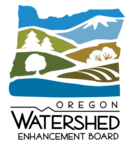Oregon Watershed Enhancement Board
 From Wikipedia - Reading time: 4 min
From Wikipedia - Reading time: 4 min
 | |
| Agency overview | |
|---|---|
| Formed | 1987 |
| Jurisdiction | State of Oregon |
| Employees | 33 |
| Annual budget | $69.5 m USD (2019-21)[1] |
| Agency executives |
|
Oregon Watershed Enhancement Board (OWEB), a state agency of Oregon in the United States, provides grants to restore watershed health and improve local streams, rivers, wetlands and natural areas in Oregon.[2] Board membership includes commissioners of Oregon's Natural Resources Board and members of the public.
History
[edit]The Governor's Watershed Enhancement Board GWEB) was established in 1987 and began accepting applications to fund watershed improvement projects in November of that year.[3]
The World of Coos Bay reported the board's charge:
The Governor's Watershed Enhancement Board, created by the 1987 Legislature, is accepting applications for projects. The board is authorized to distribute up to $500,000 for on-the-ground watershed improvement efforts in the 1987-89 biennium. Project examples include planting along streambanks, streamside fencing, in-stream habitat improvement and development of wildlife and grazing management plans, according to Lorraine Stahr of the Oregon Water Resources Department.[4]
In the primary election on May 17, 1988, Oregon voters approved Measure 1, authorizing loans for fish protection and watershed restoration.[5] In 1993, Senate Bill 81 of the Legislature provided $10 million for the Grande Ronde in Northeastern Oregon, and the South Coast and Rogue Basins in Southwestern Oregon, a pilot project known as the Oregon Watershed Health Program.[6] It became part of GWEB in 1995.[7]
In 1998, voterts also approved Measure 66, dedicating some Lottery funding to parks, beaches, habitat, and watershed protection.[8] The following year, the Oregon Watershed Enhancement Board replaced GWEB,[7] and expanded the five member board with six public members.[9]
Passage of Measure 76 in Oregon's 2010 General Election continued lottery funding for parks, beaches, wildlife habitat, watershed protection beyond 2014 and modified the funding process.[10]
In November 2020 OWEB led a Stage Zero River Restoration Workshop with panels moderated by Prof. Colin Thorne. They also played a role in the creation of a Stage Zero website to encourage similar restoration projects.
Board membership and budget
[edit]As of 2019, Board membership includes six voting members of the public, five voting commissioners of the state's Natural Resource Board, and seven advisory non-voting members.[11] Oregon's Secretary of State described the board's work: "Community members and landowners use scientific criteria to decide jointly what needs to be done to conserve and improve rivers and natural habitats in the places where they live."[12] The OWEB 2019–2021 biennium budget approved by the legislature totaled $138,910,142 USD.[1]
See also
[edit]References
[edit]- ^ a b "2019-21 Legislatively Adopted Budget Detailed Analysis" (PDF). Oregon Legislature. October 2019. p. 400. Retrieved March 10, 2020.
- ^ "Oregon Watershed Enhancement Board : About Us". State of Oregon. Retrieved February 13, 2020.
- ^ "Board has money for watershed work". Corvallis Gazette-Times. November 22, 1987. p. 21. Retrieved March 8, 2020.
- ^ "Watershed project funds available". The World. November 26, 1987. p. 3. Retrieved February 14, 2020.
- ^ "Northwest fish ballot; Measure 1 vote is long overdue". Statesman Journal. May 4, 1988. p. 8. Retrieved February 14, 2020.
- ^ Soscia, Mary Lou (June 12, 1995). "The Oregon Watershed Health Program: Local Empowerment to Restore Watersheds". Sustainable Use of the West's Water – via Getches-Wilkinson Center for Natural Resources, Energy, and the Environment.
- ^ a b "Oregon Watershed Enhancement Board : OWEB's History in Brief". www.oregon.gov. Retrieved February 13, 2020.
- ^ Keisling, Phil (November 3, 1998). "Measure 66" (Website). 1998 General Election Voters' Pamphlet, page 135. Oregon Secretary of State. Retrieved February 13, 2020.
- ^ "Salmon issue: Budget battle looms". Albany Democrat-Herald. June 4, 1999. p. 5. Retrieved February 13, 2020.
- ^ Brown, Kate (November 2, 2010). "Measure 76" (Website). Online Voters' Guide | 2010 Special Election. Oregon Secretary of State. Retrieved September 9, 2013.
- ^ "Oregon Watershed Enhancement Board : Board Members". www.oregon.gov. Retrieved March 10, 2020.
- ^ "Oregon Blue Book: Oregon Watershed Enhancement Board". Oregon Secretary of State. Retrieved February 13, 2020.
External links
[edit]- Official website
- Oregon Watershed Assessment Manual. OWEB Publications. November 20, 2000. CiteSeerX 10.1.1.738.3620.
- "Oregon Plan for Salmon and Watersheds". Oregon Watershed Enhancement Board. 2019.
 KSF
KSF